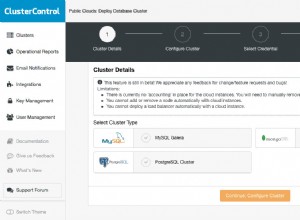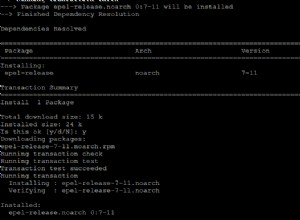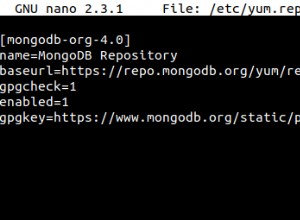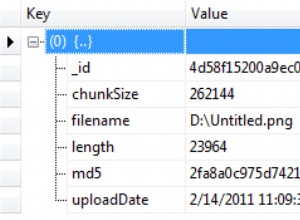Il existe plusieurs approches pour cela que vous pouvez utiliser le aggregate méthode pour
db.collection.aggregate([
// Assign an array of constants to each document
{ "$project": {
"linkedIn": 1,
"twitter": 1,
"source": { "$cond": [1, ["linkedIn", "twitter"],0 ] }
}},
// Unwind the array
{ "$unwind": "$source" },
// Conditionally push the fields based on the matching constant
{ "$group": {
"_id": "$_id",
"data": { "$push": {
"$cond": [
{ "$eq": [ "$source", "linkedIn" ] },
{ "source": "$source", "people": "$linkedIn.people" },
{ "source": "$source", "people": "$twitter.people" }
]
}}
}},
// Unwind that array
{ "$unwind": "$data" },
// Unwind the underlying people array
{ "$unwind": "$data.people" },
// Project the required fields
{ "$project": {
"_id": 0,
"name": "$data.people.name",
"source": "$data.source"
}}
])
Ou avec une approche différente en utilisant certains opérateurs de MongoDB 2.6 :
db.people.aggregate([
// Unwind the "linkedIn" people
{ "$unwind": "$linkedIn.people" },
// Tag their source and re-group the array
{ "$group": {
"_id": "$_id",
"linkedIn": { "$push": {
"name": "$linkedIn.people.name",
"source": { "$literal": "linkedIn" }
}},
"twitter": { "$first": "$twitter" }
}},
// Unwind the "twitter" people
{ "$unwind": "$twitter.people" },
// Tag their source and re-group the array
{ "$group": {
"_id": "$_id",
"linkedIn": { "$first": "$linkedIn" },
"twitter": { "$push": {
"name": "$twitter.people.name",
"source": { "$literal": "twitter" }
}}
}},
// Merge the sets with "$setUnion"
{ "$project": {
"data": { "$setUnion": [ "$twitter", "$linkedIn" ] }
}},
// Unwind the union array
{ "$unwind": "$data" },
// Project the fields
{ "$project": {
"_id": 0,
"name": "$data.name",
"source": "$data.source"
}}
])
Et bien sûr, si vous ne vous souciez tout simplement pas de la source :
db.collection.aggregate([
// Union the two arrays
{ "$project": {
"data": { "$setUnion": [
"$linkedIn.people",
"$twitter.people"
]}
}},
// Unwind the union array
{ "$unwind": "$data" },
// Project the fields
{ "$project": {
"_id": 0,
"name": "$data.name",
}}
])




